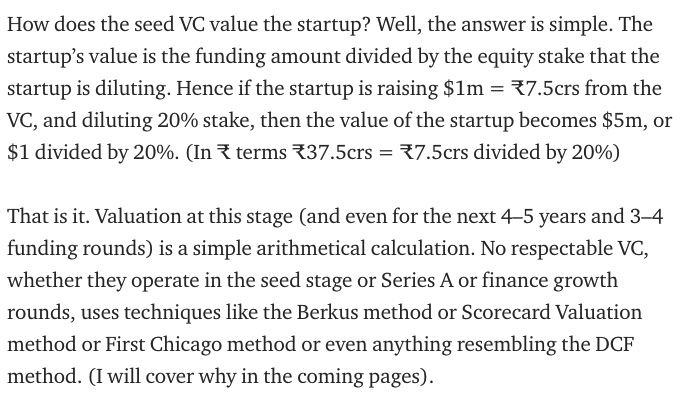
Why does a VC reject your pitch? 🧵
A perspective basis my last 3 years in a seed VC.
(this is true especially of seed investing, but holds for the broad VC asset class)
A perspective basis my last 3 years in a seed VC.
(this is true especially of seed investing, but holds for the broad VC asset class)
I work at @BlumeVentures, a seed stage tech VC, and we get 3-3,500 startup pitches a year. We can fund 10-12 at best a yr. This means that we reject a lot of great startups.
Some of these startups are rejected because they are too late or early for us, and thus don’t fit our investment criteria (blume.vc/for-startups). Some are rejected because we have invested in their competitors or in similar risk buckets we dont want to add to.
Sometimes we reject very good companies, which pass all of the above criteria because there is another company ahead of it in the mental stackrank, one which we believe is even better poised to be a bigger hyperscaled startup.
Typically if you are an investment lead like me you can lead at best 2 investments a year. So if it isn’t the #1 in the stackrank at that point, the startup will be rejected. So being #1 in the VC's stackrank matters for a startup.
Now, these stackranks are fundamentally subjective. There is no objective truth to why a startup is higher than another in the stackrank. It boils down ultimately to gut / intuition honed over years of experience and supported by high quality analysis.
Another VC may have a different view & her stackrank might well be very different.
Thus, when founders ask VCs why they rejected a co, the truth is that unless it is well outside the sweet spot or is not a conflict, then it was probably because it wasn’t #1 in the stackrank.
Thus, when founders ask VCs why they rejected a co, the truth is that unless it is well outside the sweet spot or is not a conflict, then it was probably because it wasn’t #1 in the stackrank.
For some reason, VCs find this hard to articulate. I don’t know why.
Often VCs may say stuff like if it was at X stage we would have done it but you are at 50% of X now, or they tell founders, when you get to revenue level Z1 reach out to us.
Often VCs may say stuff like if it was at X stage we would have done it but you are at 50% of X now, or they tell founders, when you get to revenue level Z1 reach out to us.
When founder hits level Z1 and reaches back to VC, the VC again assesses stackrank and if the startup isn’t #1 in the stackrank then they say come back when you hit Z2 and so on.
IMHO if a VC thinks you are likely to be biggest hyperscaling play in her stackrank, she will bet on you, subject to it fitting investment criteria / nonconflict. They will factor in the lower revenues in to the (lower) valuation they give you.
That they aren't doing it is a sign that you aren't top of the pops in their stackrank.
Founders who understand that VC is a relative, not absolute business, & thus look for the right VC who will back them, will do well.
This is my personal view. Others may differ. YMMV.
Fin.
Founders who understand that VC is a relative, not absolute business, & thus look for the right VC who will back them, will do well.
This is my personal view. Others may differ. YMMV.
Fin.
• • •
Missing some Tweet in this thread? You can try to
force a refresh







